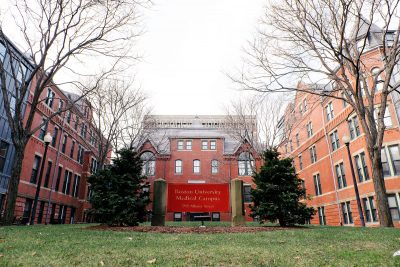
A federal court is scheduled to hear a case between the National Hockey League and Boston University on Feb. 17 in St. Paul, Minnesota regarding research conducted at BU that linked repeated head trauma to brain disease, Lawrence Elswit, an attorney who represents the university, wrote in an email.
The NHL filed a motion on Jan. 19 to demand that BU’s Chronic Traumatic Encephalopathy Center produce documents regarding the research, after the university refused to produce all of the CTE research-related materials that the league requested in October.
This request came after a group of former NHL players sued the league in November 2013 for neglecting to take necessary precautions to prevent or reduce the effects of repeated head trauma. The plaintiffs claimed that the league knew about the dangers of these repeated hits and chose not to act.
BU’s research found that blows to the head are a major contributing factor to the development of CTE, a progressive degenerative brain disease that can manifest itself months or even decades after trauma to the head, and can cause memory loss, depression and issues with impulse control, according to the CTE Center’s website.
The center provided the NHL with some of the documents it requested, but not all. In October of 2015, the center told the league that it “would only produce information for a hockey player if [it] received a signed medical release from the player’s family. [It] did not offer to produce other relevant files in redacted form,” according to the NHL’s motion.
The league believes that BU CTE Center’s “data, studies, methodologies, public assertions and their scientific bases must all be considered highly relevant” to the case former players filed against the league, according the the league’s motion. NHL declined to comment on the lawsuit.
The Board of Trustees of Boston University opposed the NHL’s request for additional research materials on Feb. 6. Both the CTE Center and the attorney representing the university declined to comment on the case.
The university claimed that it was “compelled to produce confidential information that will violate research subjects’ privacy, impose a significant burden on researchers, and create a chilling effect on future scientific inquiry,” according to the university’s opposition to the NHL’s motion.
If the CTE Center is forced to abide by the subpoena, researchers will have to stop their current work, and they could risk hurting their reputation, their funding and opportunities for future research, according to the memo.
“The burden of responding to the subpoena would effectively shut down the Center and its principal researchers for months, if not longer, thereby preventing them from doing needed research and writing, and risking the termination of current and future grant funding,” the memo states. “This burden far outweighs any probative value.”
Andy Sellars, the director of the Technology and Cyberlaw Clinic at BU, said the result of this case depends on many different factors.
“One of the things that [the court] will be weighing is whether or not the NHL can get this sort of information from other sources,” Sellars said. “To the extent that they can find it elsewhere, the court would be less inclined to make BU produce [the research].”
Sellars added that other factors include “potential burden in producing” the material that NHL demands.
“It’s not uncommon to oppose a subpoena on those grounds, in the hopes that perhaps you can limit it as well as perhaps get it quashed,” he said.
Several students said they were unsure of the legality regarding the NHL’s request.
Jared Brill, a junior in the College of Communication, said the NHL and the university could try to resolve the issue by meeting somewhere in the middle.
“I don’t think that they can demand BU to give over personal information,” Brill said. “BU could probably be more compliant and ask [the families of] the players if they want to hand over medical information.”
Stefan Smith, a junior in the College of Arts and Sciences, said the issues of concussions and CTE are too significant for the center to try not to disclose all of its information.
“What makes this less important than other research?” Smith said. “Concussions are very dangerous among athletes. They can result in long-term issues. It is very important that the NHL does take the measures they need to take.”
Allison Miller, a sophomore in COM, is on the NHL’s side of the issue, claiming that it would be beneficial for the Center to provide the NHL with its research documents.
“I think they should definitely have to give up the information,” Miller said. “They’ve been researching it. What would be the point of doing research if you’re not going to share it? Especially with the NHL — that’s the people that the research is going to affect … It’s good that the NHL is trying to find out what’s happening.”


















































































































